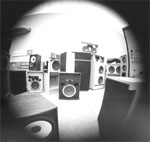Skepticism is good. I can tell you that using modest gauge magnet wire to replace nice heavy gauge Kimber at the very least does no harm. So much for needing heavy wire or cable for high efficiency drivers. I am not in a position to declare improvements; listening to the music is taking precedence over critical listening of the system performance - so it is working very well indeed. It seems the magnet wire gets in the way of detail less than larger wire and cable. I can't prove it.
I get one pound spools of double insulated for twenty dollars here: http://www.oemwire.com/smagwire1.htm
Could you elaborate on how magnet wire is not very practical for you? I find it quite convenient but do admit that I had to rethink how to run wire. It is easy if you use 18-22 gauge for the woofers and 26 or so for the tweeters. I am not the only one to find that heavier wire and more complex cables seem to loose subtlety and clarity in the resulting sound. If the rest of your system is capable of that subtlety and clarity, it goes without saying. I am tending to believe Steve Schell that lighter magnet wire is usually better than heavier magnet wire!
To me, magnet wire sounds better than expensive cable. It is for that that I use it, not for the price.
Clark






 Reply With Quote
Reply With Quote

 Synergy is a pretty fundamental concept and far be it from me to ignore it. That is why I use a lot of listening to decide what works. Conventional wisdom is pretty spotty and should always be subject to personal verification.
Synergy is a pretty fundamental concept and far be it from me to ignore it. That is why I use a lot of listening to decide what works. Conventional wisdom is pretty spotty and should always be subject to personal verification.



